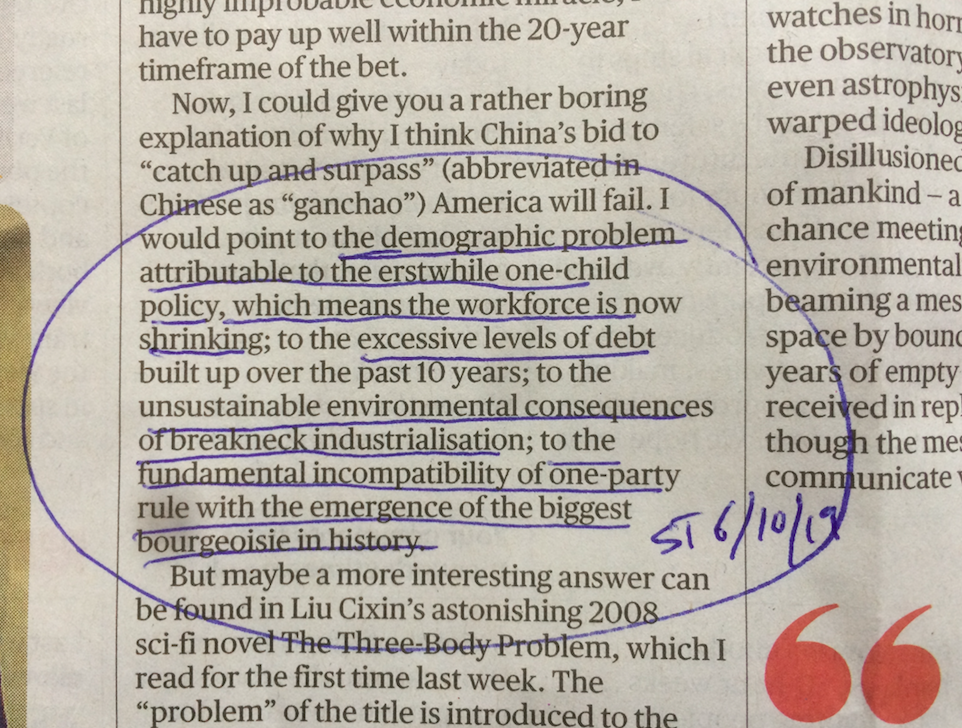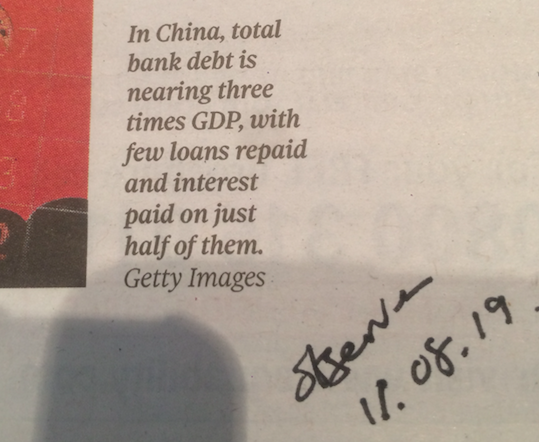
China




Between 2010 and 2013, China used more cement than the US used during the whole of the Twentieth Century.
Juliet Samuel, Daily Telegraph, 26.1.19.
Interesting news yesterday. The focus was very much on Greece, as you might expect, although what was happening in China was possibly a far bigger story and one that links to something I’ve got on my new risk map (early draft above).
If you missed it (which if you live in Europe you may well have) $3.2 trillion has been wiped off the value of the Chinese stock market in just three weeks. This may be linked to concerns about Greece, but there’s a far bigger story here in my view and one that I’ve been talking about for the past five years.
China currently has an export-orientated model. That’s fine, but it makes China hugely vulnerable to external economic shocks (such as Europe), especially when you have an imbalance of young men in the population.
It’s a bit like in that film speed, where there’s a bomb on a bus that will detonate if the bus travels at less than 50 miles per hour. China needs a certain growth rate (people used to say 8% but the figure is probably far lower than this) to keep its people happy.
If people in China (especially young men) have got jobs, homes and the prospect of buying things like cars then everyone is happy. But of Europe falls over economically this could send shock waves across China. In short the unspoken deal done by the government whereby people can get as rich as they like if they don’t criticise the ruling party blows up. People (especially young men) could be thrown out of work and potentially their homes. Hey Presto, Tiananmen Square the sequel, but this time with an overlay of social media.
Maybe that’s why the Chinese internal security budget exceeds its external defence budget. That’s what worries China!
Some worrying data coming out of China. Electricity output slumped last month, up a mere 0.7% over 2011. State investment in railways is down 44%, road building is down 2.7% and 8 out of the country’s 10 largest ship builders have not received a single new order in 2012. Housing sales were down 25% during the 1st QTR and home construction was down 28.3% last month. This last figure is a real concern because housing employs 10% of the Chinese workforce while land sales make up 70% of local authority tax revenue and 30% of central government revenue. Loans are also down significantly too. Of course this could all be planned in the sense of it being meant to slow the economy down, but it’s worth watching very closely.
India and Russia are having much the same trouble too in terms of industrial output, lending and bad loans. The big concern here is not just the BRICs going bust, but the BRIC wall of global credit collapsing before the rest of the indebted world recovers from the worst of the recession. If you have any spare cash stick it under the mattress now.
Couple of things from the recent papers.
1. A study in the UK says that the average office worker looks at his/her email at least 30 times every hour. (So what about social networks and texts?)
2. New mothers spend 90 mins a day on line in the UK. (Is that all?).
3. A report by the Royal Bank of Scotland (RBS) says that RBS clients should hedge against a sovereign debt default…by China. The concern here, and it’s a concern I’ve been talking about for a while, is that the leadership “will have to puncture the credit bubble before it reaches levels that threaten social stability.” Inflation is currently running just below 5% in China but for some food items it’s hitting 20%. Anyone in China care to comment?
BTW, thanks to Matthew for this last one. I missed the article despite reading the paper this morning. Probably spending too long also looking at email!